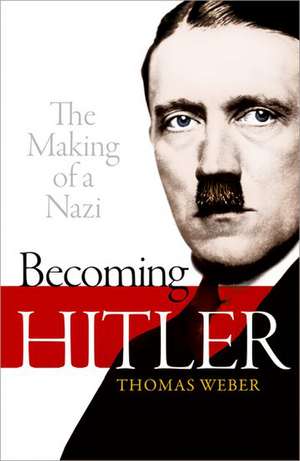Becoming Hitler: The Making of a Nazi
Autor Thomas Weberen Limba Engleză Paperback – 28 oct 2021
Preț: 83.19 lei
Preț vechi: 97.15 lei
-14% Nou
Puncte Express: 125
Preț estimativ în valută:
15.92€ • 16.66$ • 13.17£
15.92€ • 16.66$ • 13.17£
Carte tipărită la comandă
Livrare economică 25-31 martie
Livrare express 01-07 martie pentru 44.38 lei
Preluare comenzi: 021 569.72.76
Specificații
ISBN-13: 9780199664634
ISBN-10: 0199664633
Pagini: 464
Ilustrații: 16pp black and white plate section
Dimensiuni: 140 x 217 x 33 mm
Greutate: 0.5 kg
Editura: OUP OXFORD
Colecția OUP Oxford
Locul publicării:Oxford, United Kingdom
ISBN-10: 0199664633
Pagini: 464
Ilustrații: 16pp black and white plate section
Dimensiuni: 140 x 217 x 33 mm
Greutate: 0.5 kg
Editura: OUP OXFORD
Colecția OUP Oxford
Locul publicării:Oxford, United Kingdom
Recenzii
This book is hugely important: it is a genuine contribution to our understanding of one of history's ogres.
A thoroughly researched book and a must for scholars of history, Hitler, National Socialism and the Twentieth Century.
[In Becoming Hitler], Weber helps us to better understand the circumstances that can lead to the radicalization of otherwise ordinary human beings.
Vital, revolutionary, groundbreaking... Weber forces us to rethink what we know about Hitler and charts his metamorphosis into a hated demagogue.
Thomas Weber is one of the foremost world authorities on Hitler. He refuted the mantra that there was nothing more to say about the German dictator and no new sources to be found with his path-breaking study of Hitler's First War. In Becoming Hitler, he takes the story into the turbulent period after the end of the conflict and excelled himself. This new book shows that Hitler was by no means a product of his environment but swum against the Bavarian mainstream and was nearly drowned by it. The argument is once again supported by an array of fresh sources and conveyed in compelling prose.
This is the most important book on Hitler and National Socialism since Ian Kershaw's monumental biography. It is amazing how much new information and documentation Thomas Weber has used to show precisely when, how, and why Hitler's world view was shaped, and precisely where the intellectual, emotional, and social origins of genocide and of the Holocaust lay. He has precisely recreated the world of Munich in the early 1920s, to show how a burning hostility to internationalism - we would say today globalism - emerged.
The book is well written, and [...] the work is a welcome addition to the creation of a complete portrait of Hilter.
This study is revelatory ... It is highly recommended.
Brilliant.
A thoroughly researched book and a must for scholars of history, Hitler, National Socialism and the Twentieth Century.
[In Becoming Hitler], Weber helps us to better understand the circumstances that can lead to the radicalization of otherwise ordinary human beings.
Vital, revolutionary, groundbreaking... Weber forces us to rethink what we know about Hitler and charts his metamorphosis into a hated demagogue.
Thomas Weber is one of the foremost world authorities on Hitler. He refuted the mantra that there was nothing more to say about the German dictator and no new sources to be found with his path-breaking study of Hitler's First War. In Becoming Hitler, he takes the story into the turbulent period after the end of the conflict and excelled himself. This new book shows that Hitler was by no means a product of his environment but swum against the Bavarian mainstream and was nearly drowned by it. The argument is once again supported by an array of fresh sources and conveyed in compelling prose.
This is the most important book on Hitler and National Socialism since Ian Kershaw's monumental biography. It is amazing how much new information and documentation Thomas Weber has used to show precisely when, how, and why Hitler's world view was shaped, and precisely where the intellectual, emotional, and social origins of genocide and of the Holocaust lay. He has precisely recreated the world of Munich in the early 1920s, to show how a burning hostility to internationalism - we would say today globalism - emerged.
The book is well written, and [...] the work is a welcome addition to the creation of a complete portrait of Hilter.
This study is revelatory ... It is highly recommended.
Brilliant.
Notă biografică
Thomas Weber is Professor of History and International Affairs as well as the founding Director of the Centre of Global Security and Governance at the University of Aberdeen. Since earning his DPhil from the University of Oxford, he has held fellowships or taught at Harvard University, the Institute for Advanced Study in Princeton, the University of Pennsylvania, the University of Chicago, and the University of Glasgow. His first book, The Lodz Ghetto Album, won a 2004 Golden Light Award and a 2005 Infinity Award. His second book, Our Friend "The Enemy" received the 2008 Duc d'Arenberg History Prize for the best book of a general nature on the history and culture of the European continent. His third book, Hitler's First War, is the recipient of the 2010 Arthur Goodzeit Book Award of the New York Military Affairs Symposium and is being adapted into a TV mini series by UFA-Fiction and Beta Film.
